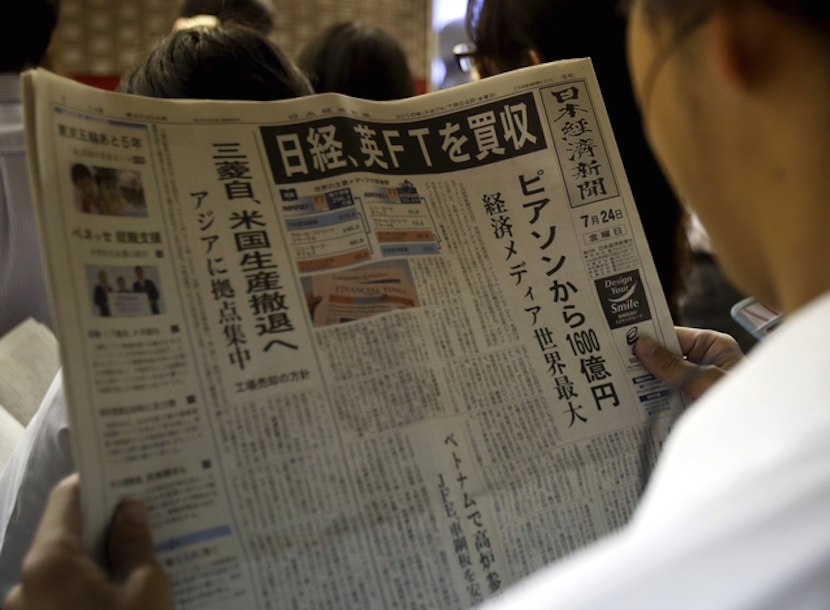
(Bloomberg) — Here we go again?
Nikkei Inc.’s purchase of Pearson Plc’s FT Group raises once more the question of whether Japanese companies pay too much for overseas acquisitions. Since the 1990s, Japanese acquirers have purchased a series of assets — from Pebble Beach golf course to wireless carrier Sprint Corp. — that often proved financially disastrous, leaving their mark in history as some of the worst dealmakers.
In the latest case, Nikkei is paying 844 million pounds ($1.3 billion), a lofty price for a newspaper company. It’s five times what the Washington Post fetched in its 2013 sale.
Here are some of the past deals:
Marquee Real Estate
Tokyo-based Mitsubishi Estate Co., which invested $1.4 billion in Rockefeller Center in 1989 and 1990, lost it seven years later after defaulting on the mortgage. Pebble Beach was acquired by golf magnate Minoru Isutani in 1990 for $841 million. It was sold less than two years later at two-thirds the price as Isutani’s company went bankrupt.
Wrong Number
SoftBank Group Corp.’s Masayoshi Son made a splash with the purchase of a controlling stake in Sprint for $23 billion in 2013. He predicted SoftBank could help the No. 3 U.S. wireless operator use new products and services to challenge the country’s leading carriers. It hasn’t worked out that way: Sprint has lost market share and seen its shares slide. SoftBank’s stake is now worth less than $12 billion.
Lehman Headache
Japanese brokerage Nomura Holdings Inc. acquired Lehman Brothers Holdings Inc.’s European and Asian businesses in 2008, in the depth of the global financial crisis. Costs swelled and the stock tanked as the company posted years of losses on its businesses outside of Japan. In the quarter ended March 31, Nomura missed its target of becoming profitable in Europe, Asia and the U.S. The stock is still down since buying the businesses, while most global bank stocks have recovered since the crisis.
Serial Overpayer
NTT DoCoMo Inc., at one time the world’s largest mobile- phone company by sales, had to write down billions of dollars related to the declining value of overseas investments in the early 2000s. AT&T Wireless Services Inc., KPN Mobile NV and Hutchison 3G UK Holdings Ltd. were among its money-losing investments. By October 2002, the writedowns had totaled 1.39 trillion yen ($11 billion), about three-quarters of DoCoMo’s non-Japanese stakes. It has since scaled back spending on phone businesses outside Asia.
Stargazers
Panasonic Corp., then called Matsushita Electric Industrial Co., bought Universal Studios’ parent MCA for the eyebrow- raising price of $6.6 billion in 1990. The Japanese owners faced a culture clash with its free-spending Hollywood managers, and five years later sold 80 percent to Seagram Co. for $5.7 billion and the rest in 2006 for $1.15 billion.
Sony Corp. bought Columbia Pictures for $3.4 billion in 1989. The company installed two producers, Peter Guber and Jon Peters to run the studio, ushering in a two-year period of profligate spending. Sony paid as much as $500 million to Time Warner to free the pair from a contract, and spent an average $40 million on each movie, about 40 percent higher than the industry. The company’s Hollywood business has since improved, helping Sony in April to forecast a fourfold increase in operating profit this year.
Pharma Deal
A year after Daiichi Sankyo Co. purchased a controlling stake in Ranbaxy Laboratories Ltd. in 2008, it became the least profitable of Japan’s top five drugmakers. Probably not what Daiichi had in mind when it paid $4.6 billion for the Indian company. After years of struggling to turn it around, Daiichi Sankyo sold Ranbaxy to Sun Pharmaceutical Industries Ltd. in a transaction that closed in late March. Daiichi Sankyo shares are up 32 percent since then.

